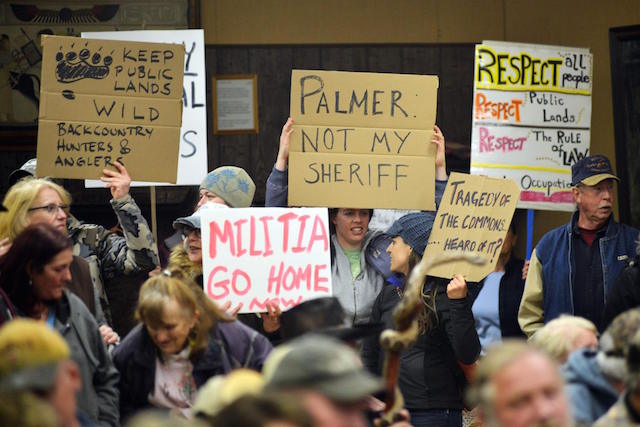
Photo courtesy of the Rural Organizing Project
Story by Pete Shaw
Almost as soon it became clear that Donald Trump was going to be the next President of the United States, Democratic Party operatives, pundits, and supporters began casting blame for Trump’s victory. Much of that blame has fallen upon rural people, and integral to those accusations has been generalizing these people–variously labeled hicks, rednecks, or hayseeds, just to name some of the pejoratives–as ignorant racists, misogynists, and bigots.
Speaking to a packed house of over 300 people at SEIU Local 49 on Wednesday night, Jessica Campbell of the Rural Organizing Project (ROP) sought to dispel these myths as well as urge Portlanders and other city dwellers to reach out to rural people whom she described as “miners’ canaries” warning of what lies ahead for the entire country if urbanites do not respond to their needs. The program–Dispatch from the Frontlines: Oregon’s Patriot Movement, the Acquittal of the Bundy Bunch, and Discussion in Connection to Standing Rock, Black Lives Matter, and the Overall Quest for Social Justice–focused on rural Oregonians’ resistance to various white supremacist factions, particularly those militia groups that compose the Patriot Movement, and the need for people to reach out and support those rural people, offering them viable alternatives to the society sought by these white supremacist movements.
Beginning with the mobilization of various militia and patriot groups such as the Oathkeepers and Three Percenters in Josephine County in 2015 (similar mobilizations, Campbell said, have taken place throughout rural Oregon), Campbell outlined a basic pattern of how these groups go to rural areas and try to set themselves up as a kind of new legitimate authority. In the case of Josephine County, they were fighting to protect the owners of the Sugar Pine Mine from the Bureau of Land Management (BLM). The mine sits on BLM land, and the BLM had required the mine owners to file a Plan of Operations regarding unapproved improvements upon the land. As Campbell said, rather than dispute the need to fill the forms or call a lawyer, the mine owners called in the Oathkeepers “to protect them from the federal government taking their gold.”
Like those who staged the 2014 standoff at Cliven Bundy’s ranch in Nevada, these self-styled patriots claimed they were liberating the land from the federal authority that had resulted in the extraction industry’s decline. From their point of view, laws and regulations were standing in the way of a God-given right to make profit off of the land, environmental consequences be damned. A similar pattern emerged when Ammon Bundy and his gang rode into Burns, Oregon and took over the Malheur Wildlife Refuge.
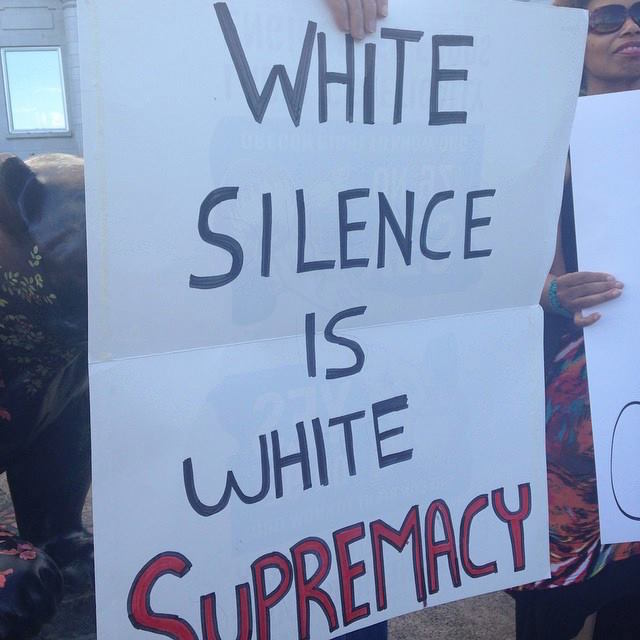
Photo courtesy of the Rural Organizing Project.
Campbell stated that, contrary to reports in the corporate media, the rural residents of both Josephine and Harney Counties (the Malheur sanctuary is located in Harney County, on the Paiute people’s land) were not on board with the white supremacist militias and their aspirations. However, those who embrace delusions of grandeur often become completely convinced of the righteousness of their cause, and they do not well tolerate dissent from their vision. So it was with these patriot groups.
“The community was so terrified,” said Campbell, “that they were not willing to say anything.” Campbell talked about people being followed home from work and intimidated, and their children followed home from school.
But eventually, once people found out they were not alone in their disdain for these white supremacist groups, they did resist. In Josephine County, a small group of citizens held a press conference on the steps of the county courthouse, declaring their opposition to the militias that had descended upon their land. That event was attended by quite a few militia members, bearing weapons, and disrupting the speakers. In Harney County, large numbers of people demanded the militia members leave, and they staged a midday rally on Monday, February 1, on the Harney County Courthouse steps. Some 350 people attended, and businesses closed to let their employees go.
Campbell insisted that rural people’s resistance to the tyranny of racist militia groups is stronger than the corporate media–and now, many Democratic Party supporters–would have us believe. The unfortunate reality, she said, is this: rural people have been forgotten by our society. The Bundy takeover of Malheur was “like the first time people in the country cared about rural Oregon”–and these militia groups are moving in, trying to fill the void.
In many rural areas, Campbell noted, the economy has been hard hit, resulting in a cascade of setbacks for civil society. Public services such as libraries have been privatized. There is no 911 operator in many areas outside of 9 to 5 office hours. When some people in one county complained about nobody responding to emergencies after hours, an answering machine was installed with a message that told people to call back when someone was there. Systems of policing are not working. In short, the system is breaking down, and there are few alternatives.
The Patriot Movement offers its own solutions through a series of inside and outside strategies, explained Campbell, that basically delegitimize the remaining government institutions, and either fill them with people loyal to their white supremacist, anti-democratic agenda, or just replace those institutions with their own illegitimate ones leaning far more toward totalitarianism. The idea of a militia group creating its own court system may sound ridiculous, but having made inroads into some sheriff’s departments in Oregon (there is one Patriot group named the Constitutional Sheriffs and Peace Officers Association), they must be taken seriously. They are attempting to create a country not far from the one Donald Trump promised during his campaign, a hyper-capitalist place that benefits only the greediest individuals at the expense of everyone else. In a region already reeling from the effects of a capitalist system that has left most of its residents behind, patriot movements offer acceleration which considering how capitalism has failed so many rural people, would seem to be a loser of a proposal.
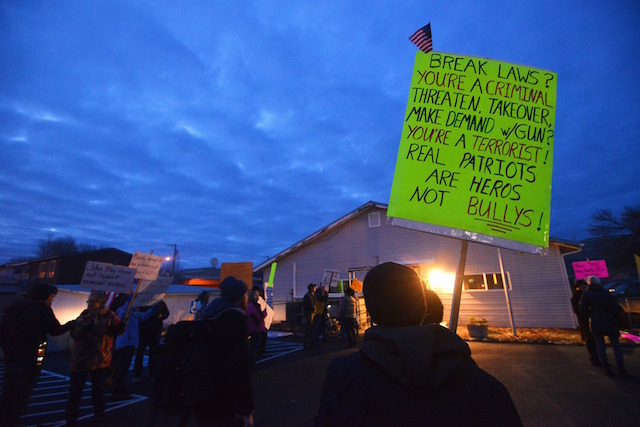
Photo courtesy of the Rural Organizing Project.
But where is the alternative? Where are the progressive Democrats who make up the majority of Oregon’s federal delegation and have a firm hand on state government? Where are the services that Democrats are supposed to provide? Campbell said that when people around Malheur called the police for help, they received no response. She described Oregon governor Kate Brown as “absent.”
“There’s a whole lot of folks who don’t hear from progressive Democrats in this state,” said Campbell, adding that many of those Democrats don’t visit rural areas because they are “afraid to be yelled at.” She urged Democratic representatives to show up and do their jobs, because, she said, “these people feel disenfranchised.”
They let these feelings of abandonment be known on November 8. Not necessarily because they liked Donald Trump’s ideas, but because they had been getting screwed over for so long by establishment politicians like Hillary Clinton.
So what to do? Fortunately, ROP–which works with 50 member groups–has a template: reach out to people and organize with them so they will be heard and their demands met. This requires outreach from people who live in cities, such as Portland and Eugene, that are viewed as liberal Meccas (despite a history clearly showing a current of white supremacist movements from Oregon’s founding to the present day).
Following Campbell’s talk, she was joined by three activists on a panel that was moderated by Scot Nakagawa of ChangeLab.
Ahjamu Umi of the All-African People’s Revolutionary Party (A-APRP) spoke to the audience about why he has helped organize security for ROP events (which aside from disruptions, have seen Campbell shot at). Umi noted a connection between the historical exploitation of resources in Africa (such as those integral to cell phones, tablets, flat screen televisions, and other similar technological items, as well as chocolate, coffee–items taken for granted by many people in the US), as well as the ruthless exploitation of the African people, and people in rural America, also being strangled by capitalism. All of this barbarism is usually swept under the rug and promoted as democracy, although any rudimentary examination shows otherwise.
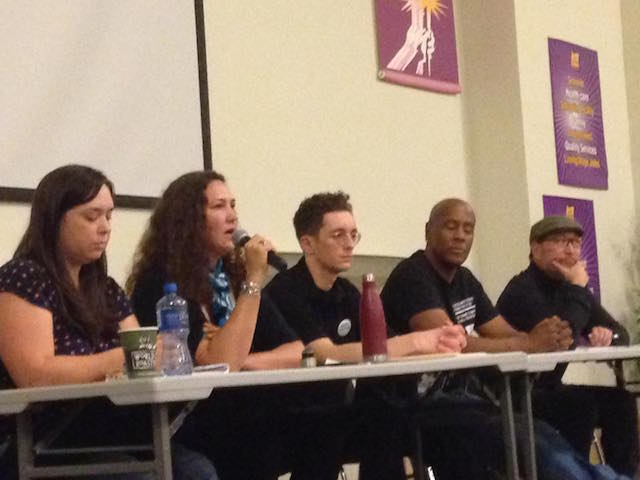
From left to right: Jessica Campbell, Danica Brown, Luis Brennan, Ahjamu Umi, and Scot Nakagawa. Photo by Chris Ferlazzo.
“America’s never been a democracy,” Umi told the audience. “It’s never been a free society. It’s never been a society based on justice. It’s always been an empire. We’ve got to understand that now because of the declining nature of the capitalist system, now we see more and more European people, more and more white people impacted by the conditions we’ve been impacted for 500 years by….The reason I participate with ROP is because we recognize that all people–working people–are oppressed by capitalism.” He then urged white people to help organize movements, particularly with other white people and white organizations that will work with groups like the A-APRP to offer an alternative to capitalism.
“America’s being exposed for what America has been for 500 plus years,” he told the crowd. “Wake up, smell the coffee, and get organized.”
Luis Brennan of the Industrial Workers of the World and the Burgerville Workers Union (BWU) noted how most Burgerville workers are white and that most Burgervilles are located outside of Portland, where the populations are even whiter than here. Noting that the white working class had been turned on by the Clintons and other Democratic Party stalwarts, Brennan said the BWU was not simply about winning approval from the National Labor Relations Board, but was far more expansive, “standing with conviction and fighting back against oppression” such as that brought on by the declining capitalist system as Umi had mentioned.
Brennan said it was important for the BWU to win its fight because “we need a durable organization to win over the white working class.” He noted that “workers are not stupid and don’t jump on sinking ships,” and that unless working people like those in the auditorium show that you can fight and win for their values–for the society they want to live in–then more and more white working people will join with white supremacists.
Danica Brown, a member of the Choctaw tribe of Oklahoma, stated, “What we’re talking about today is a continuation of white settler colonialism.” Brown has witnessed that continuity while fighting in solidarity with the Standing Rock Sioux in their battle with Energy Transfer Partners, the company attempting to build the Dakota Access Pipeline. Describing that fight as one “about our children and grandchildren having clean drinking water,” she noted that the battle has seen over people shot at, maced, and tear gassed, and that over 400 people had been arrested–all on “treaty land not ceded by the Standing Rock Sioux tribe.” (As this article goes to press, police have fired mace, concussion grenades, and water cannons–in sub-freezing temperatures–at these water defenders, resulting in at least 300 injuries.)
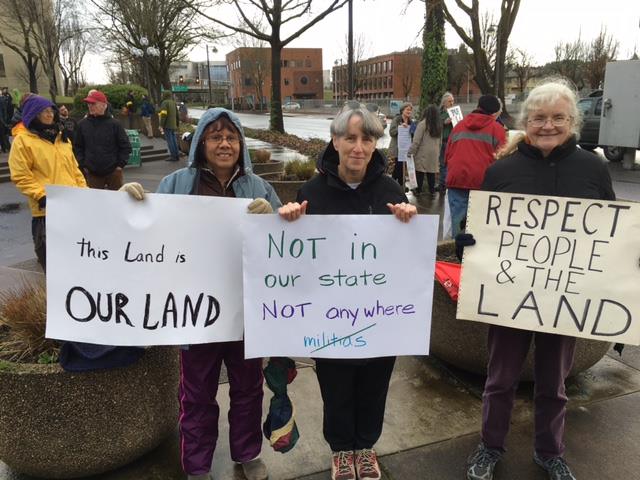
Photo courtesy of the Rural Organizing Project.
“Of course it happened,” said Brown about the violence by various police and security forces. “White supremacy in this country reigns, and it’s indicated in these actions at Standing Rock.” Nonetheless, there is resistance, and it is growing stronger by day with allies streaming into North Dakota to work with “a bunch of ragtag Indians on the northern plains…fighting for the land, fighting for the water, fighting for you.”
That fight for clean water for all stands in direct contradiction to the Patriot Movement whose battle to privatize public lands includes getting rid of government regulation. The standoff at Standing Rock presents the interesting–if in a grimly repetitive historical fashion–wrinkle of seeing a corporation with government support ignoring treaties and running roughshod over land and people all in the name of profit. If the water is poisoned, that’s someone else’s problem, and perhaps a future chance to make a buck selling clean water.
Campbell then followed with a nod to Brown, noting that the ROP had organized a busload of rural Oregonians to go to Standing Rock. She used that as a lead-in to urge urban people to have rural Oregonians’ backs and to resist those who would label all rural people as white, dumb, and racist, among other invectives. Campbell added that a lot of rural people who voted for Trump did not necessarily do so because they liked his policies but because they “are sick and tired of being shit on” by putatively progressive people, particularly those in the Oregon and federal governments.
Everyone in that auditorium–maybe throughout the United States–perhaps felt a sense of burnout from an election that seemed to go on forever. Understanding both that weariness as well as nerves scraped raw from the results, Campbell urged everyone to get themselves together and start working on strengthening ties. Rather than “unfriending” people who voted for Trump, she urged people to reach out with honesty and sincerity.
“Now’s the time to organize. It doesn’t matter how tired you are. Now is the time.”
Want to get involved?
Visit the webpages of the Rural Organizing Project, the Standing Rock Sioux Tribe, the All-African People’s Revolutionary Party, and the Burgerville Workers Union to find out how you can support these struggles. Also, please consider making a donation.
To read the Rural Organizing Project’s report on the Patriot Movement in Oregon and how to work in solidarity resisting it, go to: http://www.rop.org/up-in-arms/






